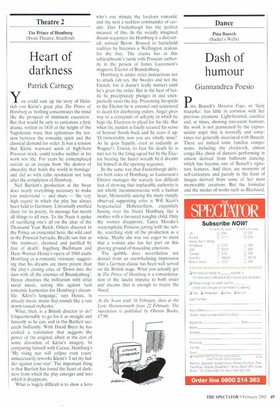Heart of darkness
Patrick Carnegy
You could sum up the story of Heinrich von Kleist's great play The Prince of Homburg as 'nothing concentrates the mind like the prospect of imminent execution'. But that would be only to caricature a lyric drama, written in 1810 at the height of the Napoleonic wars, that epitomises the tension between the romantic spirit and the classical demand for order. It was a tension that Kleist. wayward scion of high-born Prussian stock, could resolve neither in his work nor life. For years he contemplated suicide as an escape from 'the demon of absurdity that holds the world in bondage' and did so with calm resolution not long after the completion of Homburg.
Neil Bartlett's production at the Swan does nearly everything necessary to make you understand — and share — the very high regard in which the play has always been held in Germany. Universally extolled there for its poetry, its message has meant all things to all men. To the Nazis it spoke of sacrificing one's all on the altar of the Thousand Year Reich. Others discover in the Prince an existential hero, the wild card in the Prussian barracks. Brecht saw him as the mutineer, cleansed and purified by fear of death'. Ingeborg Bachmann and Hans Werner Henze's opera of 1960 exalts Homburg as a romantic visional)', suggesting that his dreams are more potent than the play's closing cries of 'Down into the dust with all the enemies of Brandenburg'. Henze chastises the militarism with strict serial music, setting this against lush romantic harmonies for Homburg's dreamlife, 'Kleist's language,' says Henze, 'is already music, music that sounds like a vast storm-tossed orchestra.'
What, then, is a British director to do? Unquestionably to go for it as straight and honestly as he can, and in this Bartlett succeeds brilliantly. With David Bryer he has crafted a translation that suggests the power of the original, albeit at the cost of some distortion of Kleist's imagery. In comparing himself with Caesar, Homburg's 'My rising star will eclipse even yours' unnecessarily reworks Kleist's 'I set my ladder against your star'. The important thing is that Bartlett has found the heart of darkness from which the play emerges and into which it disappears.
What is hugely difficult is to show a hero who's one minute the lovelorn romantic and the next a reckless commander of cavalry. Dan Fredenburgh has the perfect measure of this. In the weirdly imagined dream sequences his Homburg is a distracted, sensual Byron. Roused to battlefield realities he becomes a Wellington zealous for the fray. The drama lies in this schizophrenic's tussle with Prussian authority in the person of James Laurenson's magnetic Elector of Brandenburg.
Homburg is under strict instructions not to attack (ah yes, the Swedes and not the French, but it doesn't really matter) until he's given the order. But in the heat of battle he precipitately plunges in and unexpectedly saves the day. Presenting his spoils to the Elector he is arrested and sentenced to death for disobeying orders. Anger gives way to a crescendo of self-pity in which he begs the Electress to plead for his life. But when the pardon is finally secured his sense of honour floods back and he tears it up: '0 immortality now you are wholly miner As he goes happily, even as radiantly as Wagner's Tristan, to face his death he is met not by the firing squad but by the Elector bearing the laurel wreath he'd dreamt for himself in the opening sequence.
In the same way that Fredenburgh delivers both sides of Homburg, so Laurenson's Elector manages the scarcely less difficult feat of showing that implacable authority is not wholly incommensurate with a human heart. Memorable among the many sharply observed supporting roles is Will Keen's bespectacled Hohenzollern, exquisitely fussing over his friend Homburg like a mother with a favoured naughty child. Only the women disappoint, Tanya Moodie's overemphatic Princess jarring with the subtle, searching style of the production as a whole. Maybe she was too eager to insist that a woman also has her part on this proving ground of masculine emotions.
The quibble does nevertheless not detract from an overwhelming impression that a German classic has been well served on the British stage. What you actually get in The Prince of Homburg is a romanticisation of the fascist impulse to both order and dreams that is enough to freeze the blood.
At the Swan until 16 February, then at the Lyric Hammersmith from 22 February. The translation is published by Oberon Books, £7.99,






































































 Previous page
Previous page